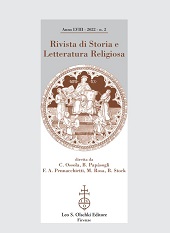Nacqui sotto riti barbari : ma di barbaro cuore però non fui : conversion from Islam to Catholicism in Early Modern Italian Commedy
P. 273-310
Conversion was a very pressing issue in early modern Europe. Christians often converted out of opportunism rather than belief, though declaring to having converted only outwardly to save themselves. In the same period, the Turkish other increasingly appeared on the Italian stage, and four Italian comedies discuss conversions from Islam to Catholicism.
It has been contended that, contrary to what happened in reality, dramatic characters convert after realising that they had led a life filled with mistakes, and that theatre moved spectators to renewed devotion through displays of religiosity. However, through an analysis of the dramatic motives, conversion and (re)integration in these plays of slave, soldier and women converts, this article suggests that their authors do not necessarily portray sincere converts. Rather, the plays transmit social criticism regarding the conversion and (re)integration of converts, are concerned with questions of insincerity and religion-switching, and do not discard the complexity of the conversion process. [Publisher's text]
Fait partie de
Rivista di storia e letteratura religiosa : LVIII, 2, 2022-
Articles du même numéro (disponibles individuellement)
-
Informations
Code DOI : 10.1400/291879
ISSN: 2035-7583


